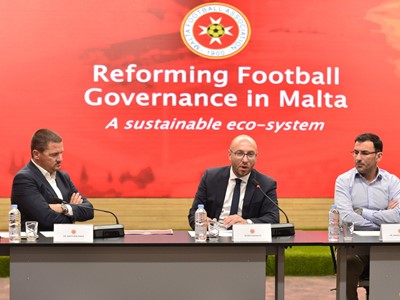Archives
Governance and sustainability at heart of Malta FA reforms
Published: 22-07-2020 10:05
The Malta Football Association has embarked on an extensive governance reforms process covering a range of key sectors, namely ethics and integrity, revision of the Association’s statute, procurement, club licensing and corporate restructuring. These on-going reforms are in sync with the formulation of a new four-year strategy for the Association which is expected to be published by the end of October.
Addressing a press conference, Bjorn Vassallo, the Malta FA President, said the long-term sustainability of local football lies at the heart of these reforms. “From day one of my mandate, the sustainability of the football sector has been a top priority for the Association,” Vassallo said. “Sustainability rests on two crucial aspects – good governance, based on best practices and higher standards, and financial stability which is dependent on finding a balance between income and expenditure along with long-term investment. “We at the Malta FA are convinced that this is the only way to deal with the current challenges, adopting a systematic approach to have fair competitions which encourage clubs to embrace financial discipline and long-term stability.” The reforms are being conducted by different committees with Dr Matthew Paris, the Malta Vice-President, overseeing the whole process which is expected to take 30 months. Giving an overview of the objectives of the reforms, Dr Paris said these can be divided into two – those related to the Association and those aimed at clubs. “It’s crucial that we don’t look back but strive to identify and implement new mechanisms that enable us to move forward,” Dr Paris said. Speaking about the corporate restructuring exercise, Dr Paris said the COVID-19 response package presented by the Malta FA recently is not only aimed at helping clubs to recover and fill the financial void created by the pandemic. “We are also looking to create vehicels to help the clubs grow financially,” Dr Paris said. “Financial sustainability is the key and it is possible to find the right balance between the club’s identity and long-term investment.” Dr Angelo Chetcuti, the Malta FA General Secretary, spoke about the procurement policy and procedures being adopted by the Association, Dr Stefan Buontempo gave an update on the work of the Ethics and Integrity Committee and Dr Peter Fenech on the work of the Clubs’ Licensing Reform Committee. Also present for the press conference was Dr Dawn Aquilina, the Malta FA’s Strategy Officer.ETHICS AND INTEGRITY The Ethics and Integrity Committee is primarily focused on addressing any conduct that tarnishes the integrity and reputation of football, especially illegal, immoral and unethical behaviour. It will endeavour to compile a Code of Ethics for internal staff and external stakeholders, and a conflict-of-interest policy STATUTE REFORM The principal tasks and responsibilities of the Statute Reform Committee are to revise and modernise the Malta FA’s Statute and decision-making processes. The key points include:• Term and/or age-limit for President and Executive Committee/Board members• Checks and balances system to be in place• Balanced gender representation on the Executive Committee/Board• Statutory definition of members’ rights and obligations in line with FIFA/UEFA standards• Definition of roles and powers of the President, Executive Committee/Board and administrative body• Clear rules on congress authority, agenda, elections, decision-making and minutes in line with FIFA/UEFA standards PROCUREMENT POLICY The purpose and scope of the Procurement Policy and Procedures is to structure the Association’s purchasing processes and sourcing strategies to ensure that the services and goods acquired are the result of transparent, objective, time and cost-effective decision making and risk management. RESTRUCTURING OF THE NATIONAL LEAGUE The clubs’ status has been revised based on the respective divisions with clubs in the Premier League allowed to have a professional status. This will lead to a restricted number of teams playing top-level football. Clubs in the Challenge League (former First Division League) will have a semi-professional status. The remaining clubs, which sportingly competed in the Second and Third Division competitions, will have amateur status in the newly-established National Amateur League. CLUB LICENSING REFORM The development of football plays an essential role in the wider development of the game for both men and women. The broadening of the licensing criteria represents a significant step in the development of the licensing system. It is very important for clubs, professional or amateur (community-based) to commit to minimum standards in key areas such:• Youth Development• Infrastructure• Administrative Structures• Financial Parameters• Legal Criteria This reform is intended ensure fairer competitions, financial discipline and long-term stability. CORPORATE RESTRUCTURING The corporate restructuring entails the revision of regulations to reflect the requirements of modern football clubs. The plan is that by January 2023 clubs will be classified according to their licence and status. It is being proposed that Recreational clubs be constituted as a sports entity, those competing in the National Amateur League as foundations or recreational sports entity while Challenge League and Premier League clubs are to be constituted as a sports limited company.